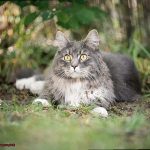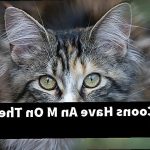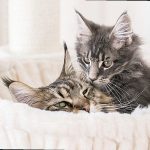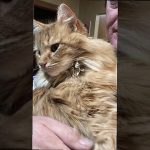Can cats eat garlic bread?
The answer is no. Garlic bread is not safe for cats to consume, as it contains a toxin called thiosulphate which accumulates in their bodies over time and causes them to become ill.
Cats cannot break down garlic, onion, chives or leeks well because they do not have the enzyme that breaks these compounds into smaller pieces that are easier to digest.
In this blog post, we will discuss how garlic is poisonous to cats and why you should never give your cat any garlic-based food or treats.
What is Garlic Bread?
Garlic bread is a type of bread that is made with garlic and butter, or olive oil.
It can also include other herbs and spices. The flavor of garlic pairs well with the flavor of bread, and this is why it is often used in recipes for this dish.
Garlic toast is a popular snack or side dish throughout the world.
Can cats eat garlic bread?
Cats cannot eat garlic bread for a number of reasons. For one, cats have different dietary needs from humans. What is okay for us to consume may not be okay for cats and vice versa.
The answer is no as cats cannot eat garlic bread.
For the sake of your cat’s health, garlic bread is off-limits for feline consumption.
Garlic bread is one of the meals that a cat can’t eat since it contains certain harmful ingredients like garlic and butter, which are not good for cats.
These ingredients can cause digestive problems in cats, so it’s best to avoid feeding them this type of food.
Why Are cats allergic to garlic bread?
Cats cannot eat garlic or other food items that include garlic.
Garlic contains a toxin called thiosulphate, which is extremely toxic to cats and can even be fatal to them if consumed in large doses.
If a cat unintentionally eats a bit of garlic, they will not be able to digest it.
It becomes increasingly difficult for them to recover from the illness it inflicts.
Consequently, it is a fact of life that cats cannot eat garlic or other food items that include garlic.
Signs of Garlic Poisoning in Cats
Here are some symptoms to look out for if you believe that your cat has eaten garlic bread.
- Collapse
- Pale gums
- Increased heart rate
- Increased respiratory rate
- Difficulty breathing, labored or rapid breathing
- Fatigue and weakness, also cats may become very lethargic after eating garlic bread
- Diarrhea
- Vomiting, cats may vomit up the garlic bread or their regular food after ingesting it.
If you are noticing any of these symptoms in your cat then this is a life threatening emergency and needs to be treated immediately by a veterinarian! Garlic poisoning can lead to death very quickly so please do not hesitate to seek help if you think your cat has eaten garlic bread.
What To Do If Your Cat Ate Garlic Bread?
You can usually find garlic bread at most Italian restaurants, and it’s a popular dish. But what do you do if your cat eats garlic bread?
Garlic is toxic to cats and can cause them to vomit, have diarrhea, or even go into a coma.
If you think your cat ate garlic bread, contact your veterinarian immediately. The vet may be able to induce vomiting or give your cat an infusion to help regulate their blood pH levels.
If you’re feeling overwhelmed, don’t worry! The majority of cats that eat garlic bread will be just fine. But it’s always better to be safe than sorry, so contact your veterinarian if you have any concerns.
How much garlic bread is enough to make a cat fall sick?
Cats are fussy eaters and will often turn their noses up at things that smell or taste different from what they are used to.
This means garlic bread is not a food cats would naturally eat, so if you want to give them some then go carefully.
Start with just a tiny bit of garlic bread in case your cat doesn’t like it, and make sure it’s plain bread with no other ingredients.
This way, if your cat does get sick you’ll be able to work out what caused the problem.
There are cats that can eat garlic bread without any side effects at all, but there is always a risk of making them ill even in small doses.
If cats have too much garlic bread, they might start vomiting or have diarrhoea.
In extreme cases, eating too much garlic can even lead to liver damage in cats.
So if you’re thinking of giving your cat some garlic bread, go easy and keep a close eye on them to make sure they’re not having any adverse reactions.
What To Feed Your Cat Instead Of Garlic Bread?
Cats can eat toast, but you should be careful about cats eating garlic bread because it is not good for them.
The best thing to do would be to avoid the temptation of giving your cat a piece of garlic bread altogether.
It’s better if you focus on feeding them something else entirely instead.
Garlic Bread Is Not Good For Cats
Garlic bread can be dangerous for cats because garlic contains sulfoxides and disulfides which are poisonous to cats.
These substances will give your cat bad breath, vomiting or drooling as well as a lack of appetite.
Additionally, the yeast in garlic bread is likely to cause stomach upset if eaten by cats.
Also Read: Can Cats Eat Fried Fish?
Can Garlic Bread Kill Cats?
Cats and garlic bread don’t usually mix, as cats are more at risk from eating certain plants than people are.
Onion and garlic are the most common causes of cat poisoning in humans.
Anemia and possibly death might result if a cat consumes significant quantities of garlic bread. So while it’s not going to kill your kitty instantly, it’s best to avoid garlic bread altogether to be safe.
Instead, try some cat-safe snacks like tuna or chicken. Your furry friend will thank you!
Conclusion
Cats can’t be educated to totally avoid such stuff because they’re animals, therefore the owner bears the brunt of the duty.
But there are a few things you can do if your cat is going through a really rough patch and needs some help. One option would be to put them on an elimination diet for 12 weeks, which means feeding them their own food exclusively without any treats or extras from outside sources like garlic bread.
Ideally, it’s best not to give cats anything that could potentially harm them, but in this case, we recommend talking with your vet about what foods might work well before starting out on an elimination diet.
So, you don’t deprive kitty of too many nutrients!







